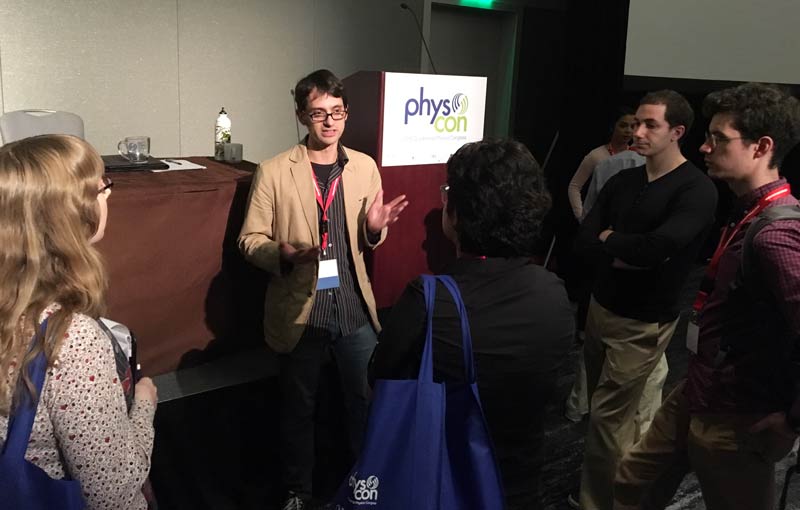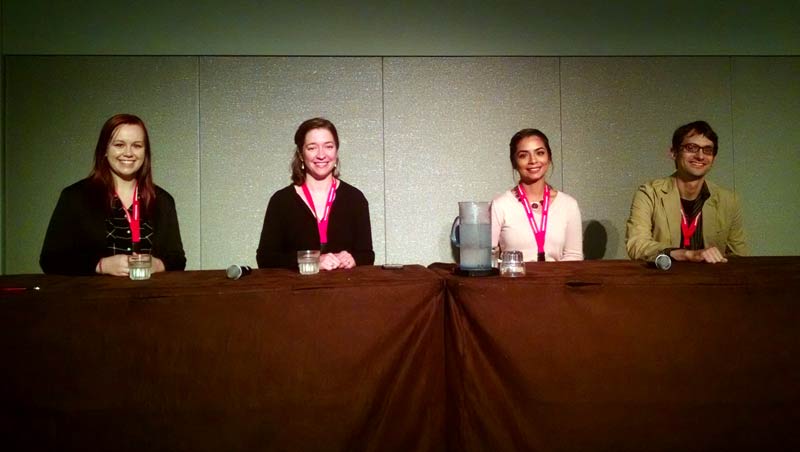Sigma Pi Sigma Physics Congress (PhysCon)
November 3, 2016 to November 5, 2016
San Francisco, CA
Meeting host: By:Michael Chambliss, Keegan Karbach, and Eli Nygren
SPS Chapter:

Among the multitude of activities offered at PhysCon conference was a workshop titled “What is grad school really like?” Three panelists and one moderator, all young, aspiring physicists in the midst of their own graduate programs, offered their unique wisdom about how to succeed in life after the bachelor’s degree.
Chris Faesi, a 6th year PhD student at the department of Astronomy & Astrophysics, Harvard University, moderated the panel, which included Amandeep (Aman) Gill, a Masters student at University of Nevada, Reno; Katherine Zaunbrecher, a post-doc at Colorado State University and the National Renewable Energy Lab; and Kelby Peterson, a PhD student in physics education at Oregon State University.
Often in “Q and A” panels like this, the audience requires a fair amount of persuasion to participate. That was certainly not the case in this workshop; not one second after the panelists were introduced, it seemed that almost every other audience member’s hand shot up into the air.
The first two questions aimed to understand how graduate coursework is tailored to one’s focus area: astronomy and physics education, respectively. Faesi explained how, in his case, all his coursework and professional contacts originate from the astronomy department, not the physics department. He said however, that this may differ at other schools. He explained that graduate school can funnel you into one specific area and that students must be sure that area is what they want out of their academic careers. As a counterpoint, when posed with a similar question, Peterson explained that the route she has taken in physics education research has provided a broad range of experiences. She takes courses specific to physics education and qualitative research in addition to the graduate courses that all other PhD candidates take. These responses reminded us that graduate programs are highly variable and we must take care to ensure that our experience is what we want it to be.
The panelists then discussed how they have had to re-prioritize their responsibilities, balancing research, coursework and TA-ing. Both Zaunbrecher and Peterson explained that one must constantly reassess what is most crucial at a given moment. Some weeks, research demands the bulk of your attention, while in other weeks, coursework prevails. Perhaps the only thing that remains a constant, says Peterson, is the paid commitment to your department, saying, “You need to view your T.A. position as a job, and never let that one slide.” At the end of the day, the purpose of obtaining a PhD is to develop one’s career, and being a professional requires that you can assess situations, react appropriately, and do the best job that you possibly can. During undergraduate study, homework is consistently the main focus, but after the bachelor’s degree, the focus shifts much more toward professional development.
Perhaps the most frequently discussed topic of the entire workshop was that of work-life balance. It was refreshing to hear from all the panelists the refrain that maintaining a life outside of school is of critical importance. From Gill admonishing us to learn when to stop working and not to attempt all-nighters as we age to Zaunbrecher telling us about discovering hobbies and friends outside of her department the room seemed to let out a collective sigh of relief knowing that grad school does not spell the end of a social life. Graduate study is a time of self-discovery and social networking that has a unique culture all its own. One aspect to this networking is reaching out to people both in your field as well as other fields of study. Attending conferences--traveling to different regions and meeting interesting people--is a great way to do this. However, the panelists agreed that physicists and other scientists only make up a small percentage of people in the world and meeting people from different walks of life can be a refreshing break from the rigors of studying.

Panelists also offered their advice on choosing an advisor, one of the most important decisions a graduate student must make. Students must remember that this is a close professional relationship that will last for several years (if not longer), and like any relationship, personalities and professional styles must complement one another. It is not uncommon to switch advisors during a graduate program, but this decision must be made as early as possible to avoid setbacks.
The culmination of a graduate program--defending your thesis--is daunting. Students worry about failing at this point, after all the time leading up to the defense. Faesi assured us that these fears are unwarranted and that any good department will support the decision to defend your thesis only when they feel that you are ready to do so. The act of writing a thesis is typically just a matter of finishing telling the story of the research you have previously accomplished and tying up loose ends. Deadlines set by the department can be helpful to ensure that you are making consistent progress with this and your department and committee members alike truly want you to succeed.
ltimately, though, the panelists reminded us to carefully inspect our motives for attempting an advanced degree. While a master’s or PhD may be necessary for some careers (high level research or professorship), graduate study may not be the appropriate next step for everybody.
By the time Chris called for the last question, many hands were still high in the air and the panelists offered to stay afterward for any remaining questions. This was a good idea--only about half of the attendees actually left the room when time was called. The panelists graciously stayed, answering questions in a more intimate setting, until well after the hotel banquet staff had finished cleaning the room. They elaborated on points made earlier and addressed more specific topics with individuals or small groups of students. Faesi shared stories of both successes and failures in maintaining romantic relationships in grad school, explaining how becoming involved with someone in the same field can be rewarding, yet has the possibility of leading to competitive undertones.
Seeing how these panelists stayed to talk with students, while most other people were going to dinner, displayed the commitment and the compassion that they have for both their fields and the greater physics community. Every single person in attendance could see this, and left with a feeling of excitement and hope. While the panel answered many questions about the practical aspects of graduate school, they did not neglect the personal aspects. What is grad school really like? After attending this workshop, we feel confident in knowing that it is as satisfying as we choose to make it. The words of the panelists still resonate today: You are capable of anything, you are not an imposter, and remember that you got into this in the first place because you love physics.